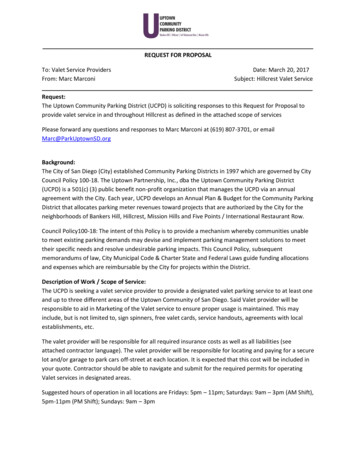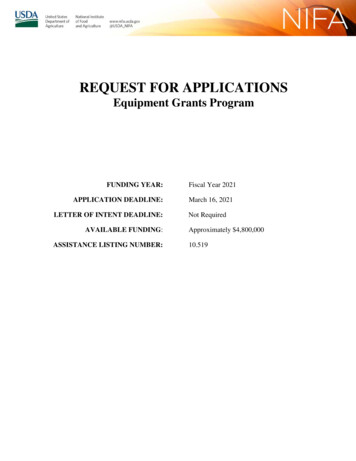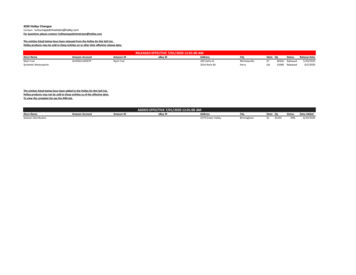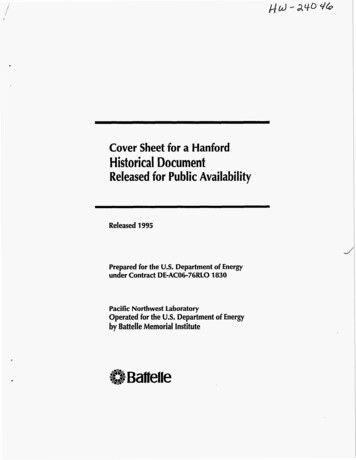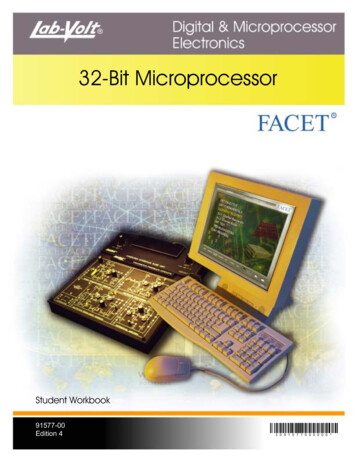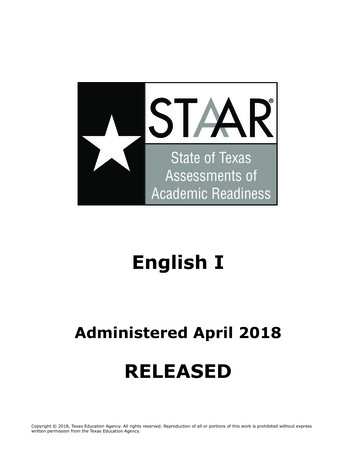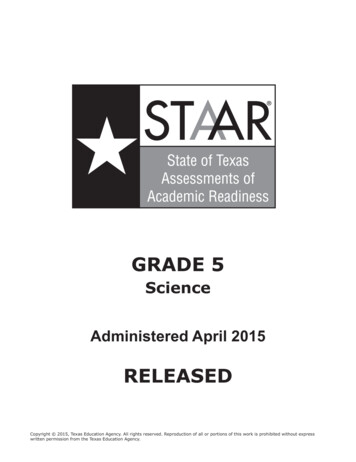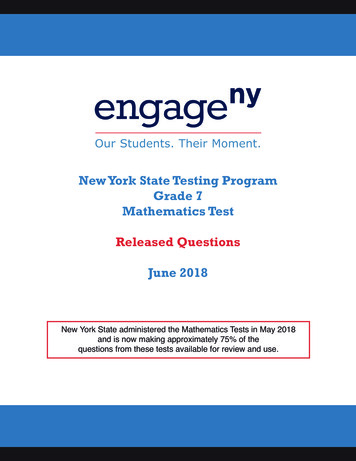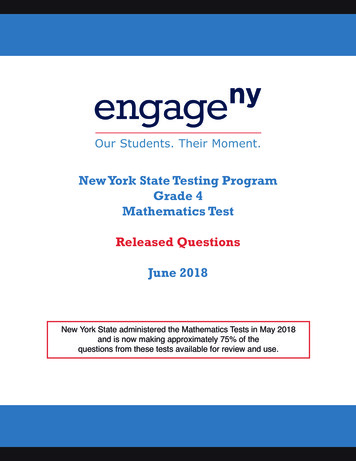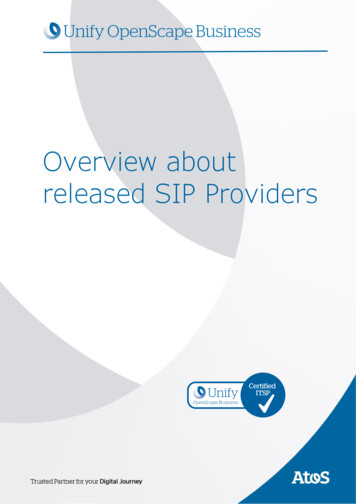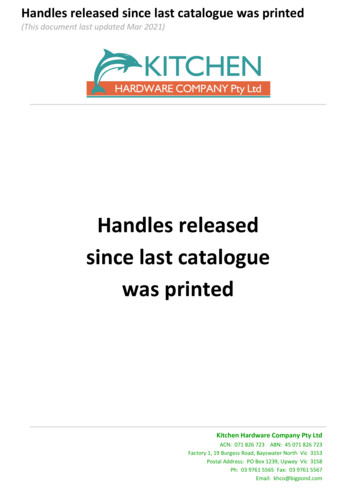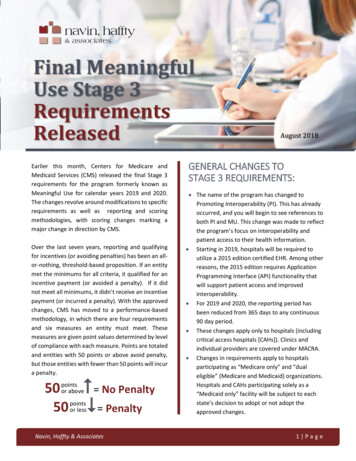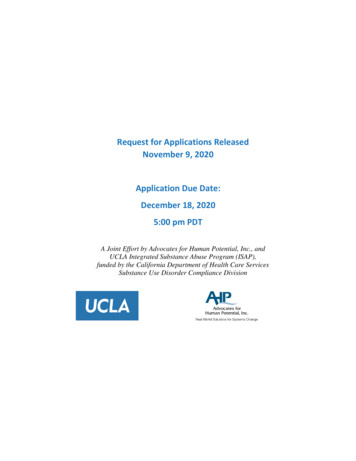
Transcription
Request for Applications ReleasedNovember 9, 2020Application Due Date:December 18, 20205:00 pm PDTA Joint Effort by Advocates for Human Potential, Inc., andUCLA Integrated Substance Abuse Program (ISAP),funded by the California Department of Health Care ServicesSubstance Use Disorder Compliance Division
Improving Treatment of Stimulant Use Disorders with Evidence Based PracticesTable of ContentsENHANCING USE OF EVIDENCE BASED PRACTICES TO TREAT PATIENTS WITH PSYCHOACTIVESTIMULANT USE DISORDERS (PSUD) IN SPECIALITY CARE PROGRAMS .3PURPOSE . 3OBJECTIVES . 3FUNDING OPPORTUNITY .4REQUEST FOR APPLICATIONS (RFA) OVERVIEW . 4TRUST Pilot Project Timeline& Payment Schedule . Error! Bookmark not defined.FUNDING INFORMATION . 5Grant Requirements and Mandatory Participation .6TRUST Manual . 6GPRA & Data Collection . 6Webinars and Coaching Calls . 642 CFR Part 2 . 6ELIGIBILITY CRITERIA .7Priority Scoring . 72
Improving Treatment of Stimulant Use Disorders with Evidence Based PracticesENHANCING USE OF EVIDENCE BASED PRACTICES TO TREAT PATIENTSWITH PSYCHOACTIVE STIMULANT USE DISORDERS (PSUD) IN SPECIALITYCARE PROGRAMSPURPOSEThe California Department of Healthcare Services (DHCS) administers the Medication for AddictionTreatment (MAT) Expansion Program, which monitors and provides support for treatment programming.Because alarming increases in stimulant use has been identified among patients across the State,supplemental DHCS funds have been directed toward improving the quality of program services andincreasing the uptake of evidence-based resources to address this rising trend. DHCS, with University ofCalifornia, Los Angeles–Integrated Substance Abuse Programs (UCLA ISAP) and Advocates for HumanPotential, Inc. (AHP), is offering an opportunity to participate in a pilot project focusing on the emergentuse of stimulants, namely methamphetamine and cocaine, among patients in publicly-funded specialtysubstance use disorder (SUD) treatment. The broad goal is to offer an opportunity for SUD providers tobe trained and coached to deliver a manualized integrated, research-supported, multi-componentapproach using the TRUST model developed by Richard Rawson, Ph.D., Albert Hasson, MSW, MichaelMcCann, M.A., and Janice Stimson, PsyD) to enhance and improve the treatment experience of UD).OBJECTIVESThe increase in stimulant use across California within our specialty SUD and primary care systems hascreated distinct challenges for health systems that needs to be addressed. Providers working withinspecialty SUD settings need evidence-supported tools and strategies to more effectively deliver care. Thisproject seeks to:Objective 1: Determine provider needs and gather recommendations to meet those needs.Objective 2: Evaluate the feasibility, utilization, and perceptions of an evidence-supportedintervention at the organizational, clinician and patient levels.Objective 3: Conduct quality improvement cycles to determine feasibility and acceptability ofan evidence-supported intervention.Objective 4: Collaborate with specialty SUD sites to develop and disseminate materials,resources, and evidence-based strategies that are responsive to current and future projectedneeds.3
Improving Treatment of Stimulant Use Disorders with Evidence Based PracticesFUNDING OPPORTUNITYREQUEST FOR APPLICATIONS (RFA) OVERVIEWThrough this RFA, AHP in partnership with UCLA ISAP seeks to identify 10subgrantees to be trained and coached to deliver a 12-week integrated, researchsupported, multi-component intervention manual for the treatment ofindividuals with Psychoactive Stimulant Use Disorder (PSUD). The TRUST manual(Treatment and Recovery for Users of Stimulants) includes the followingevidence-supported strategies, as well as a compendium of evidence-supportedresources for program use:1. Motivational incentives (based on contingency management research;max earning of 75/year)2. Elements of cognitive behavioral therapy (CBT)3. Elements of community reinforcement approach (CRA)4. Motivational interviewing skills (MI)5. Physical exercise6. Mutual Aid Peer Recovery Support Groups (e.g. 12-Step; ModerationManagement; SMART Recovery; Women for Sobriety; LifeRing SecularRecovery; Secular Organizations for Sobriety) program participationencouragedTo be trained and coached to deliver 12-week integrated, research-supported,multi-component intervention manual for the treatment of individuals with PSUD.AHP is seeking 10 applicants to participate as pilot TRUST Implementation sites, in two staggered cohortsbetween February 2021 – September 2022. All applicants will be selected in January 2021, with Cohort 1(5 sites) expected to begin training and implementation activities in February, 2021 and Cohort 2 (5 sites)beginning training and implementation activities in September, 2021.Quantification of essential elements of clinical readiness, acceptability, feasibility, and effectiveness of theTRUST manual will be developed. Data elements considered for evaluating this pilot project includeorganizational, clinical, and patient level data. Expected data collection will occur at 3 key points: (1) Priorto TRUST training and implementation (Baseline); (2) Following enrollment and completion of 40 patients;(3) Project Completion. See TRUST Pilot Project Timeline & Payment Schedule, below.Data collection approaches will include key informant interviews with staff, brief staff surveys, trackingand monitoring of delivery of the TRUST intervention components, and number of patients receiving pilotintervention and retaining in care. Data collection efforts will help identify readiness of sites to implementeach of the TRUST components; barriers/facilitators of implementation; content of interventionsdelivered prior to TRUST implementation; provider and patient perceptions of manualized intervention,experiences of delivery, service utilization (tracking activities) such as attendance, patient characteristics(GPRA data).4
Improving Treatment of Stimulant Use Disorders with Evidence Based PracticesTRUST Pilot Project Timeline & Payment SchedulePayment 1( 22,500.00)JAN2021FEB-MAR2021COHORT 1 SiteSelection fSurveys) TRUSTManualTrainingCOHORT 2 SiteSelection fSurveys)Payment 2( 22,500.00)APR-AUG2021SEPT-OCT2021 TRUST ManualImplementationwith 40 PSUDpatients OngoingTracking oftreatmentservices andpatientretention nterviews;BriefSurveys) TRUSTManualTrainingPayment 3( 5,000.00)NOV 2021MAR 2022APR2022AUG-SEPT2022 ProjectCompletionDataCollection(BriefSurveys) TRUST ManualImplementationwith 40 PSUDpatients OngoingTracking oftreatmentservices andpatientretention nterviews;BriefSurveys) NG INFORMATIONSubgrants will be awarded in amounts up to 50,000 per site over an 18-month period. Approximately 3,000 of the dedicated funds must be allocated for patient incentives for their participation in datacollection activities and completion of behavioral goals. Remaining funds ( 47,000) will be used for staffworking directly on intervention implementation, supplies, workforce development and other start-upand specified costs.Funds will be distributed to subgrantees in 3 payments aligned with 1) staff training, 2) TRUST manualimplementation, and 3) data collection deliverables. Sites will submit invoices to AHP once the abovelisted deliverables have been completed. An Initial payment of 22,500 (45% of total funds) will bedistributed following completion of Baseline data collection activities and Completion of staff training onthe TRUST Manual. A second payment of 22,500 (45% of total funds) will be distributed followingcompletion of TRUST Implementation with 40 patients and follow-up data collection. A final payment of 5,000 (10% of total funds) will be distributed after completion of the close-out data collection activities.(Agreements are subject to the approval of AHP, as authorized and funded by DHCS.)5
Improving Treatment of Stimulant Use Disorders with Evidence Based PracticesGrant Requirements and Mandatory ParticipationTRUST ManualEach site will use the manualized TRUST model intervention over 12 weeks to 40 patients with a primaryPSUD, for a total of 400 patients across all ten sites over 18-months. The TRUST manual is a compilationof several existing evidence-supported strategies. It integrates well-established approaches for treatingPSUD including motivational incentives (i.e., contingency management), CBT, and CRA, delivered in amotivational interviewing style. Participation in physical exercise and self-help/mutual support groupsbenefit those in early recovery, and TRUST flexibly integrates these evidence-supported practices as well.Duration of implementation activities is dependent upon the rate at which patients are recruited, but isnot expected to exceed 18 months.GPRA & Data CollectionAs part of the project, clinical and programmatic staff are expected to conduct follow-up data collectionwith patients using GPRA surveys. Project staff are also expected to track the number of patientsreceiving pilot intervention, and retaining in care, as well as delivery of the TRUST interventioncomponents. This tracking will occur in collaboration with and support from UCLA ISAP.Webinars and Coaching CallsFoundational and on-going training and technical assistance (TA) will include the following sequentialactivities: One 60-minute preparatory Zoom session with UCLA ISAP training teamEight 2-hour intensive Zoom training sessions delivered by UCLA ISAP over 8 weeksSeven semi-weekly implementation support Zoom sessions with UCLA ISAPSeven monthly virtual Coaching calls with UCLA ISAP45 CFR Part 75 and 42 CFR Part 2Selected applicants shall comply with the regulations set forth in 45 CFR Part 75 and 42 CFR Part 2, toensure maintenance of the appropriate data protocols as part of infrastructure development and stafftraining, including the responsibility for assuring the security and confidentiality of all electronicallytransmitted patient material. Applicants should review the 42 CFR Part 2 privacy and the SubstanceAbuse and Mental Health Administration (SAMHSA) confidentiality rules o-i-exchange-part2.pdf .6
Improving Treatment of Stimulant Use Disorders with Evidence Based PracticesELIGIBILITY CRITERIAAll Drug MediCal Certified Specialty Care SUD programs that can bill MediCal for patient care (e.g.: musthave MediCal contracts with the County in which they reside) are eligible to receive funding. Applicantsmust meet the following additional eligibility criteria to apply: Minimum of 3 years delivering Intensive Outpatient Programming (IOP) to individuals age 18and aboveTechnical capacity to participate in virtual Zoom trainings, TA, and ongoingsupervision/coachingMinimum annual treatment enrollment of 75 PSUD patients in previous 2 years at the physicallocation that is applying; target patient population for pilot is non-opioid patients (patientsnot receiving MOUD)Willingness and ability to initiate project in either February 2021, (Cohort 1) or September2021, (Cohort 2)Site staff with demonstrated experience delivering behavioral interventions to individualswith SUDsCommitment to training/coaching activities over the course of the project, for a minimum of2 staff, consisting of at least 1 counselor and 1 supervisor-level clinicianCommitment to working with UCLA ISAP team to participate in data reporting activitiesCompliance with 45 CFR Part 75 to ensure fidelity with the Uniform AdministrativeRequirements, Cost Principles, and Audit Requirements for Health and Human ServicesAgency Awards.Compliance with 42 CFR, Part 2 to ensure maintenance of the appropriate data protocols andstaff training, including the responsibility for assuring the security and confidentiality of allelectronically transmitted patient material.Priority ScoringTo ensure equity, representation of underserved populations, and responsiveness to most impacted andhighest-need regions across the state, we will take the following into consideration when selecting sites: geographic diversityrural and urban variationdiversity in patient characteristics including: gender, sexual orientation, age, race, ethnicity, andlanguageregional data demonstrating significant use of stimulants and a critical need for PSUD-specifictreatment services7
Improving Treatment of Stimulant Use Disorders with Evidence Based PracticesAPPLICATION CONTENTSApplication contents include completion of (1) site survey (30 points) and (2) descriptive/explanatorytext (70 points). See Scoring Rubric below.1.2.3.4.5.Demonstrated Need -- Rating Factors (10 points; 250 word, maximum)Describe the population characteristics of the region, and the demonstrated consequences ofstimulant use in region? (e.g., estimated overdose, ED visits, unmet treatment need, etc.)Describe the local/regional need for specialized interventions targeting stimulant use? What areservice gaps for PSUD? How are novel interventions expected to fill a demonstrated gap?Program Characteristics -- Rating Factors (25 points; 350 word, maximum)Describe program, setting, and patient characteristics? Discuss patient retention and the biggestbarriers to patients retaining in treatment.Describe program experience delivering outpatient SUD treatment services. Describe previousexperience implementing new practices.Describe any previous experience with implementing time-limited grants.6. Describe current infrastructure capacity, the site space, and ability to provide a range of serviceswithin existing clinic space.Clinical & Staffing Experience and Capacity (25 points; 350 word, maximum)7. Describe current staffing capacity, and a brief staffing plan for TRUST implementation, including planfor who will deliver the intervention, who will provide supervision support, and who will beresponsible for championing the effort and ensuring adequate patient enrollment.8. Detail staff experiences delivering manualized SUD treatment interventions, and current approachesto treating PSUD, in specific. List clinic staff who will be trained, including position, license, degree,years experience, etc.Data / Tracking Capacity -- Rating Factors (10 points; 250 word, maximum)9. Describe site experience with tracking, monitoring, and evaluation activities. Describe your currentdata collection efforts, and site experience with collecting patient-level data, including anyexperience with GPRA data.10. Discuss how record-keeping and data collection efforts are currently managed, and who is dedicatedto supporting these activities. Staff will be expected, at a minimum, to track number of sessions apatient completed, treatment continuation and discharge. Describe how staff time will be dedicatedto monitoring and tracking activities for the TRUST implementation pilot.To access application contents please click here to complete the online application.8
UCLA Integrated Substance Abuse Program (ISAP), funded by the California Department of Health Care Services . Albert Hasson, MSW, Michael McCann, M.A., and Janice Stimson, PsyD) to enhance and improve the treatment experience of individuals with Psychoactive Stimulant Use Disorder (PSUD).
